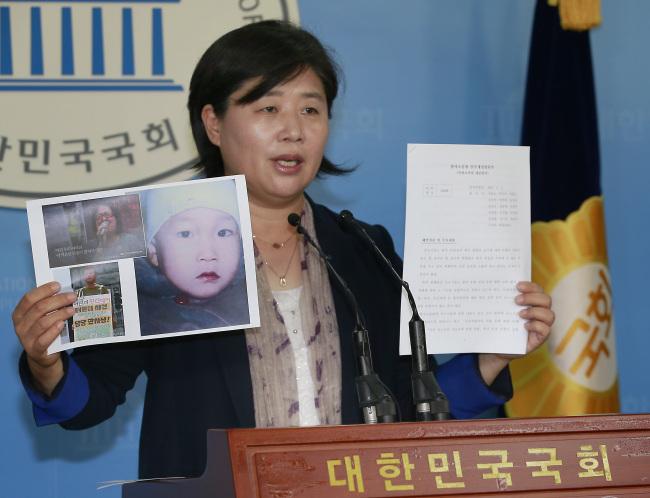Lawmakers are pushing to abolish the time limit for murder cases in an effort to prevent those who commit heinous crimes from circumventing punishment.
The bill review subcommittee of the National Assembly’s Legislation and Judiciary Committee on Wednesday passed a bill to lift the statute of limitation, which puts an expiration date on prosecution of crimes, on all kinds of homicide cases. The current criminal procedure law stipulates a 25-year statute of limitation for those accused of committing homicide. The bill awaits approval at the assembly’s plenary session on July 24.
“The bill will give us an opportunity to get to the bottom of unsolved murder cases,” said Rep. Seo Young-kyo of the main opposition New Politics Alliance for Democracy in a press conference. Seo took the lead in drafting the bill along with fellow lawmakers.
 |
| NPAD Rep. Seo Young-kyo holds a press conference about a revision bill that lifts the statute of limitation on homicide cases at the National Assembly, Tuesday. (Yonhap) |
The revision, however, does not extend to manslaughter or parricide cases. Other relevant bills, such as extending the statute of limitation for those convicts sentenced to more than five years for crimes with scientific evidence, also failed to get approval at the committee meeting.
The move came after a mysterious homicide case failed to find the perpetrator as it reached the end of its statute of limitation. In 1999, a 6-year-old boy was killed by an unknown attacker who doused him with sulfuric acid. The statute of limitation for homicide at the time was 15 years.
Even though his parents pleaded for the court to review the case until they found the murderer, Korea’s Supreme Court last year dismissed the request. The case’s statute of limitation then expired and the case was classified as cold.
“The bill will help prevent yet another tragedy like an innocent 6-year-boy’s death. It will bring those who committed heinous crimes to justice. The murderers might enjoy a time limit for their crimes, but the pain of the victims of the crimes never has a limit,” Seo said.
Experts said the bill is a step in the right direction because those who commit homicide should be subject to different legal punishments from other criminals.
“I am in favor of the move,” said Choi Cheong-hak, criminal law professor from Korea National Open University. “Some people suggest that the current 25-year statute of limitation is sufficient to bring pains to perpetrators, because they have to live with the fear of getting caught for a long period of time. But I believe those who committed homicide deserve more than that,” said Choi.
By Yeo Jun-suk (jasonyeo@heraldcorp.com)

